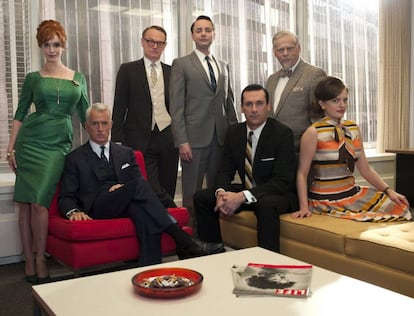Office temptations: why we fantasize about people at work who we normally wouldn’t find attractive
There are people who beyond our professional universe would never attract our attention. But, for some reason, between meetings, coffee breaks and delivering reports, their attractiveness multiplies substantially

It’s difficult to hear the phrase “in a limited environment, everything is magnified” without immediately thinking about the TV series Big Brother. Similar phrases were constantly used by the show’s participants to explain how they fell passionately in love with people who they normally wouldn’t have even looked at in their daily lives.
Any insulated social ecosystem has the ability to change the perception of attractiveness we feel. Danielle Cohen, a blogger for The Cut, noted this when she wrote about the so-called “office 10.” This term refers to co-workers who would never attract our attention outside the office but between meetings, coffee breaks and delivering reports, their attractiveness multiplies substantially (making them a “perfect office 10″). In a drab environment, anything can shine.
A recent We-Vibe survey revealed that 75% of workers queried have had some type of interest or relationship, from flirting to a full-blown romance, with a coworker. So, why are there people who we would never notice outside of a work environment who suddenly become such an attractive prospect in the office?
“It’s a matter of focus,” explains Dr. Xavier Fàbregas, who specializes in addiction. “In an environment that’s often routine and boring, we tend to focus on stimuli that, in other environments, would go unnoticed. It’s the same thing that happens to us when we’re in an airport or a train station and we pay special attention to [the other] passengers.”
Carmen Raya, a journalist, shares her experience with EL PAÍS: “The most exciting moment of starting any job is, for me, noticing the guy who, outside the office, I wouldn’t have even said ‘good morning’ to. The problem is that, on one occasion, I made the mistake of making the fantasy materialize and I discovered that everything should have stayed in my head…”
Ana Lombardía, a relationship expert at We-Vibe, supports this sentiment. She notes how office life, which is often monotonous, can offer a fantasy that “cheers us up” and distracts us during the workday. This allows us to make our day-to-day more bearable. “Fantasies are, in themselves, idealizations that are very gratifying… [but] we can get carried away by their attractiveness and lose ourselves in them. Furthermore, when we don’t know someone very well, the information gaps or ‘blank spaces’ that we have about that person tend to be filled in by our fantasies. It’s a stylized and idealized construction... which can be far from reality,” she warns.
This is precisely what occurs with dating apps. When extensive conversations are carried out, the texters may create idealized images of each other… something that, following face-to-face contact, can dispel the fantasy. In reality, the charm of the “office 10″ fades the moment the workday ends. Just as Cinderella’s fantasy had a curfew, office crushes only work under LED bulbs.
Carmen Raya understands this perfectly. “After a stressful day — in which you’ve had 45 fights [with customers and co-workers] — you go to the bar downstairs and end up in the arms of one of your colleagues. Of course, once the first two or three sexual encounters have passed, you say ‘goodbye’ to adventure and ‘hello’ to madness. I no longer knew what I was doing or why I was doing it, but there I was, crashing into him. My happy ending was changing jobs and never seeing him again,” the journalist laughs.
Office romances have always been a sweet treat for television series, which have made the working world their favorite setting. From Grey’s Anatomy to The Office, fiction has reflected on countless occasions how the work environment is incredibly libidinous. Specifically, in Mad Men, the series starring Jon Hamm, which ran from 2007 until 2015, it was well-illustrated how, when a man notices a coworker, discretion tends to decrease.

“In work relationships, there’s a big risk”
Dr. Xavier Fàbregas doesn’t believe that, in principle, showing interest in someone with whom we share a large part of our daily lives necessarily undermines professionalism. “However, both men and women will feel upset if we’re treated as objects, if we’re used in ways that [are incompatible] with who we are and what we really want. In the past, comments about female co-workers were tolerated but today, they’re seen as inappropriate and degrading. Nowadays, whether they’re made by men or women, it seems out of place to us.”
“In work relationships, there’s a big risk: should these fantasies transcend [into reality], they can lead to very uncomfortable situations in a space where we constantly meet the person whom we fantasized about.”
Lombardía, who specializes in sexuality, affectivity and couples therapy, emphasizes that, traditionally, women have been more discreet and reserved when it comes to showing interest in another person. This is because while male sexual desire is often encouraged, stimulated and expressed, female sexual desire is frequently punished and socially penalized. Hence, women tend to display it much less. “If this happens in the work environment, it’s often labeled as being even more inappropriate. Also, women are required to demonstrate more of their professional worth simply because they’re women… it’s considered to be a distraction or a lack of professionalism to reveal any type of interest in a colleague,” the psychologist and sexologist affirms. In fact, the survey carried out by We-Vibe indicates that men are more likely to have sexual and romantic relationships at work.
While 93% of those surveyed believe that there’s no problem with co-workers dating or having a sexual relationship, in the case of “office 10s” — since these are, in reality, platonic interests meant to make a 9-5 shift more bearable — the best thing (according to Dr. Fàbregas) is to keep in mind that we will be seeing these people again… something that can be very uncomfortable on a daily basis should a private fantasy become reality. “The only thing we can do in this game between fantasies and reality is to apply some distance. Of course, this isn’t so simple in a workspace that we all have to go to every day,” he acknowledges.
An “office 10″ is intended to make the hours in front of the computer more bearable, when burnout and boredom weigh down on workers. But, just as with celebrities, it’s best that a fantasy remains just that: a fantasy. If not, it can very easily lose its magic.
Sign up for our weekly newsletter to get more English-language news coverage from EL PAÍS USA Edition
Tu suscripción se está usando en otro dispositivo
¿Quieres añadir otro usuario a tu suscripción?
Si continúas leyendo en este dispositivo, no se podrá leer en el otro.
FlechaTu suscripción se está usando en otro dispositivo y solo puedes acceder a EL PAÍS desde un dispositivo a la vez.
Si quieres compartir tu cuenta, cambia tu suscripción a la modalidad Premium, así podrás añadir otro usuario. Cada uno accederá con su propia cuenta de email, lo que os permitirá personalizar vuestra experiencia en EL PAÍS.
¿Tienes una suscripción de empresa? Accede aquí para contratar más cuentas.
En el caso de no saber quién está usando tu cuenta, te recomendamos cambiar tu contraseña aquí.
Si decides continuar compartiendo tu cuenta, este mensaje se mostrará en tu dispositivo y en el de la otra persona que está usando tu cuenta de forma indefinida, afectando a tu experiencia de lectura. Puedes consultar aquí los términos y condiciones de la suscripción digital.









































